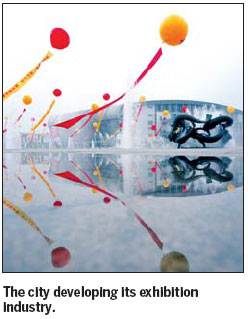Ningbo Special: Ningbo: Transformation to an international port city
|
At the confluence of three rivers - the Yuyao, the Fenghua and Yongjiang - the Sanjiangkou area is at the center of Ningbo. Photos Provided to China Daily |
The historic port city of Ningbo in Zhejiang province has developed a blueprint to turn itself into an international port during China's 12th Five-Year-Plan (2011-2015) period.
The latest projections follow a range of recent efforts to modernize the city. In 2008, Hangzhou Bay Bridge from Jiaxing to Ningbo - the longest cross-water bridge in the world - opened to traffic and China's State Council approved a plan for the Meishan Free Trade Port.
This year, the Zhejiang Oceanic Economic Development Zone was approved as part of the State development strategy.
Ningbo has 1,500 kilometers of coastline and more than 60 deepwater berths that can accommodate vessels of more than 10,000 tons. It also has links with more than 600 ports around the world.
It plans to use the advantages to become an internationally important port and ocean-centered city by expanding infrastructure, increasing cooperation with other ports, making better use of its resources and improving logistical services for the oceanic economy.

Riding a boom in its port economy, city officials say Ningbo will work harder to build a more modern city with integrated, urban-suburban development with an urbanization ratio of 70 percent over the next five years.
It already has a new development pattern for urbanization and wants to improve its economy with a more modern system of advanced tertiary industries, innovative secondary industries and modernized agriculture.
The city government wants to develop strategically important industries and group them with other industries to increase competitiveness and modernization.
The officials say new scientific and technological developments such as "The Internet of things" will allow the city to accelerate technology and industrialization by sharing information and building an intellectual base with a better urban administration and regulations.
Sustainable development will enable Ningbo to emphasize conservation and the harmonious growth in society and the environment.
City leaders want to save energy, reduce emissions and promote a recycling economy. Plans will address climate change in a more active way by advocating a low-carbon lifestyle for an environmentally friendly society, as well as in growth, consumption, industrial structure.
As more attention is paid to the "Happiness Index" around the world, the Ningbo government wants to improve the quality of life and well being in the city.
Targets call for the income gap between rich and poor to shrink over the next five years and establishment of a more complete social security system that benefits both urban and rural residents and public services equally dispersed.
(China Daily 12/21/2011 page15)













